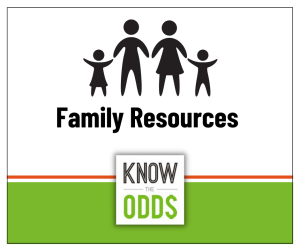The Impact of Gambling on Family Members Posted On
Did you know that June is National Family Month? Family can mean different things to different people, but they all function under one premise, love and commitment to one another. When we are part of a family we worry about our families’ best interests and want to make sure they are healthy and happy.
Navigating Difficult Conversations
When we think about gambling, we often do not realize the impact it has on family members. If someone you love is having difficulty with their gambling, it may affect you as well. Know the Odds (KTO) has a family member course designed to help navigate difficult conversations. Often when you’re trying to help, that message gets lost in translation, and everyone winds up feeling frustrated or angry. We designed this online course to help families navigate conversations about gambling behavior in a way that will be more productive. 
Topics of Conversation
Our Emotions
- When a loved one is gambling, we may experience a variety of emotions, such as anger, hurt, and disappointment. It can be frustrating, and we may wonder if we did something, or we may be worried what will happen if someone finds out. All these emotions are normal. The KTO course “How do I manage My Emotions” discusses this in further detail and can help you manage those emotions you are feeling.
Why Do Our Loved Ones Gamble?
- We may also wonder why our loved one is gambling? Did we cause this? Did something happen that caused them to gamble? People can gamble for a variety of reasons, including peer pressure, anxiety or boredom. You may not understand it but they continue to do so. It’s important to understand why your loved one is gambling so you can start taking steps to address it and consider solutions. The course “Why Is My Loved One Gambling” can walk you through this.
Gambling and Lying
- It’s important to know that people who struggle with addiction are not liars, it’s common for anyone to lie about behaviors they are not proud of. It is essential to learn about the motivations for lying and why your loved one may be doing this if they are having difficulty with their gambling. The course “When Your Loved One Is Lying” talks about this as well as how to have helpful conversations about it.
Ambivalence is Normal
- Change is hard, and while you may be ready for your loved one to stop gambling, they may not be so sure. Remember that this is normal, and their motivation may change on a day to day basis. While this may be difficult for you, it’s important to remember that this is normal. In the module “Ambivalence is Normal” it walks you through this reasoning as well as exercises about change.
Changing Motivation
- While we can’t change a person’s behavior, we can work to enhance people’s motivation. It’s important to learn the stages of change so that we can understand the process of addiction and support a loved one if they are ready to take that step. Learn more about “Changing Motivation” at KTO.
OARS
- OARS refers to Open Questions, Affirmations, Reflections and Summaries. OARS are foundational techniques used in motivational interviewing and are an empathic counseling approach. You can use these techniques as you seek to help your loved ones. Visit the “OARS” module on the Know The Odds website to learn more.
Your Health & Wellbeing
Most importantly, make sure you are checking in with yourself. If you have a family member or loved one who is having difficulty with their gambling it can take a toll on your mental health and wellbeing. Taking care of yourself can help you take care of your family members and loved ones. Know that help is available for you and your loved ones. The New York State Problem Gambling Resource Centers can help get you connected. Visit NYProblemGamblingHELP.org for more information.
